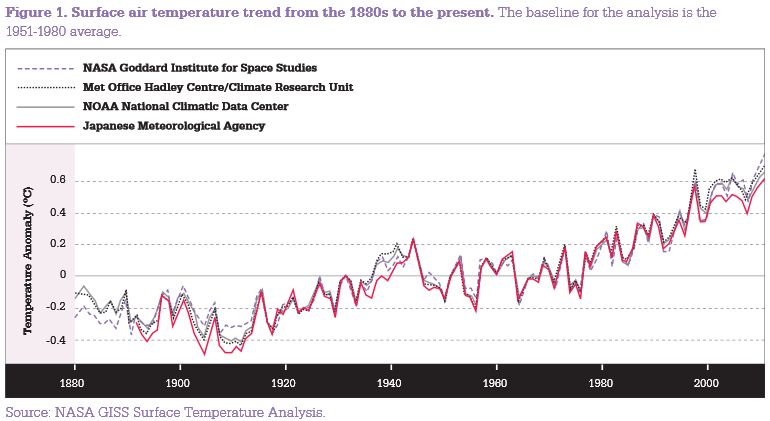|
News & Views item - March
2013 |
 The
Australian Climate Commission: The Anthropogenic Affect on Climate
Change and Our Weather is Now Clear. (March 4, 2013)
The
Australian Climate Commission: The Anthropogenic Affect on Climate
Change and Our Weather is Now Clear. (March 4, 2013)
The Australian Climate Commission's website states that it "was established to
provide all Australians with an independent and reliable source of information
about the science of climate change, the international action being taken to
reduce greenhouse gas emissions, and the economics of a carbon price". It's
latest report, just released says simply: "It is beyond reasonable doubt that
human activities – the burning of fossil fuels and deforestation – are
triggering the changes we are witnessing in the global climate."
Here in summary are the points made by the Commission to support its argument
that we are now in a critical decade.
__________________________________________________
The Critical Decade: key messages
Over many decades
thousands of scientists have painted an unambiguous picture: the global climate
is changing and humanity is almost surely the dominant cause. The risks have
never been clearer and the case for action has never been more urgent.
Our Earth’s surface is warming rapidly and we can already see
social, economic and environmental impacts in Australia.
Failing to take sufficient action today entails potentially
huge risks to our economy, society and way of life into the future. This is the
critical decade for action.
The following points highlight the key messages arising from
the accompanying [72 page] report
The Critical Decade :
:
1. There is no doubt that the climate is changing. The
evidence is overwhelming and clear.
- The atmosphere is warming, the ocean is warming, ice is being lost from
glaciers and ice caps and sea levels are rising. The biological world is
changing in response to a warming world.
- Global surface temperature is rising fast; the last decade was the
hottest on record.
2. We are already seeing the social, economic and
environmental impacts of a changing climate.
- With less than 1 degree of warming globally the impacts are already
being felt in Australia.
- In the last 50 years the number of record hot days in Australia has more
than doubled. This has increased the risk of heatwaves and associated
deaths, as well as extreme bush fire weather in South Eastern and South
Western Australia.
- Sea level has risen by 20 cm globally since the late 1800s, impacting
many coastal communities. Another 20 cm increase by 2050, which is feasible
at current projections, would more than double the risk of coastal flooding.
- The Great Barrier Reef has suffered from nine bleaching events in the
past 31 years. This iconic natural ecosystem, and the economy that depends
upon it, face serious risks from climate change.
3. It is beyond reasonable doubt that human activities – the
burning of fossil fuels and deforestation – are triggering the changes we are
witnessing in the global climate.
- A very large body of observations, experiments, analyses, and physical
theory points to increasing greenhouse gases in the atmosphere – with carbon
dioxide being the most important – as the primary cause of the observed
warming.
- Increasing carbon dioxide emissions are primarily produced by the
burning of fossil fuels, such as coal and oil, as well as deforestation.
- Natural factors, like changes in the Earth’s orbit or solar activity,
cannot explain the world-wide warming trend.
4. This is the critical decade. Decisions we make from now
to 2020 will determine the severity of climate change our children and
grandchildren experience.
- Without strong and rapid action there is a significant risk that climate
change will undermine our society’s prosperity, health, stability and way of
life.
- To minimise this risk, we must decarbonise our economy and move to clean
energy sources by 2050. That means carbon emissions must peak within the
next few years and then strongly decline.
- The longer we wait to start reducing carbon emissions, the more
difficult and costly those reductions become.
- This decade is critical. Unless effective action is taken, the global
climate may be so irreversibly altered we will struggle to maintain our
present way of life. The choices we make this decade will shape the
long-term climate future for our children and grandchildren.


![]() The
Australian Climate Commission: The Anthropogenic Affect on Climate
Change and Our Weather is Now Clear. (March 4, 2013)
The
Australian Climate Commission: The Anthropogenic Affect on Climate
Change and Our Weather is Now Clear. (March 4, 2013)
![]() :
: